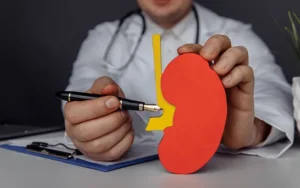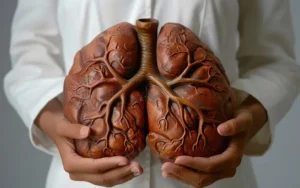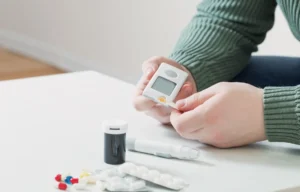Kidney complications of diabetes are a chronic condition that can lead to severe kidney problems. Managing blood sugar levels is important to prevent these risks.
This article explores the kidney complications of diabetes and strategies for prevention.
 Here are some kidney disease complications of diabetes, below
Here are some kidney disease complications of diabetes, below
 Let’s Discuss some elderly diabetes complications
Let’s Discuss some elderly diabetes complications
 Here are some tips to prevent kidney Complications
Here are some tips to prevent kidney Complications

Kidney Disease Complications of Diabetes
 Here are some kidney disease complications of diabetes, below
Here are some kidney disease complications of diabetes, below
Understanding the risk
Diabetes can manage the kidneys over time, leading to nephropathy. Early detection is key to managing and slowing progression. High blood sugar levels can harm blood vessels in the kidneys.Preventive Measures
Regular monitoring of kidney function is essential for those with diabetes, Lifestyle changes and medications can help protect kidney health. It’s important to control blood sugar and blood pressure levels.Diabetes Elderly Complications and Kidneys
 Let’s Discuss some elderly diabetes complications
Let’s Discuss some elderly diabetes complications
Challenges in the elderly
Elderly individuals with diabetes are highly susceptible to kidney issues. Age-related factors complicate diabetes management. Regular health check-ups are vital to detect any early signs of complications.Management Strategies
Customized treatment plans are necessary for the elderly. These include dietary adjustments and careful medication management. Regular consultations with healthcare providers are recommended.Long-Term Complications of Diabetes
Long-term diabetes management is important to prevent complications such as kidney disease. Chronic high blood sugar can lead to multiple organ damage. Kidney complications are among the most common.Strategies from prevention
Preventive care includes maintaining an ideal body weight, eating a balanced diet, and regular exercise. These measures significantly reduce the risk of developing serious kidney complications.Tips To Prevent Kidney Complications
 Here are some tips to prevent kidney Complications
Here are some tips to prevent kidney Complications
Control your Blood Sugar levels
Keeping your blood sugar levels within recommended ranges is important. Consistent blood sugar management can significantly reduce the progression of kidney damage.Monitor Blood Pressure
High blood pressure can cause further damage to weakened kidneys. Managing your blood pressure can help prevent additional harm and slow the progression of kidney disease.Maintain a Healthy Diet
A diet low in sodium, processed sugars, and fats can help manage diabetes and reduce the burden on your kidneys. Focus on fresh fruits, vegetables, whole grains, and lean proteins.Regular Screening
Early detection of kidney damage can make a significant difference in outcomes. Regular urine tests for protein and blood work to check kidney function should be part of your routine healthcare.Quit Smoking
Smoking impairs blood flow to the kidneys, exacerbating kidney damage, Quitting smoking can improve kidney function and benefit your overall health.Stay Hydrated
Drinking enough water helps the kidneys clear sodium, urea, and toxins from the body, significantly reducing the risk of developing chronic kidney disease.How CCD Helps You Prevent Kidney Complications













